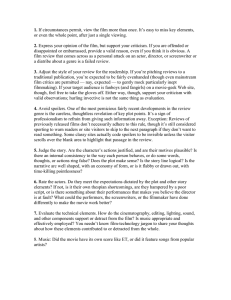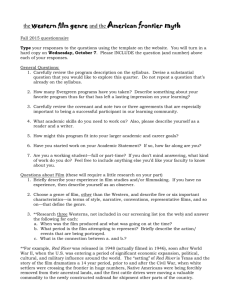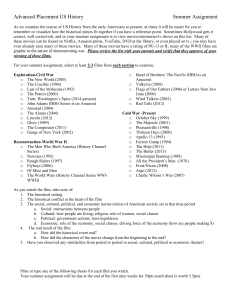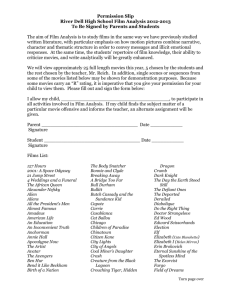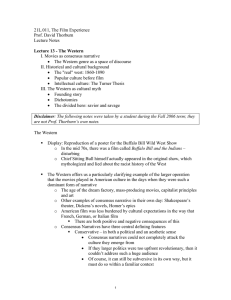21L.011, The Film Experience Prof. David Thorburn Lecture Notes
advertisement
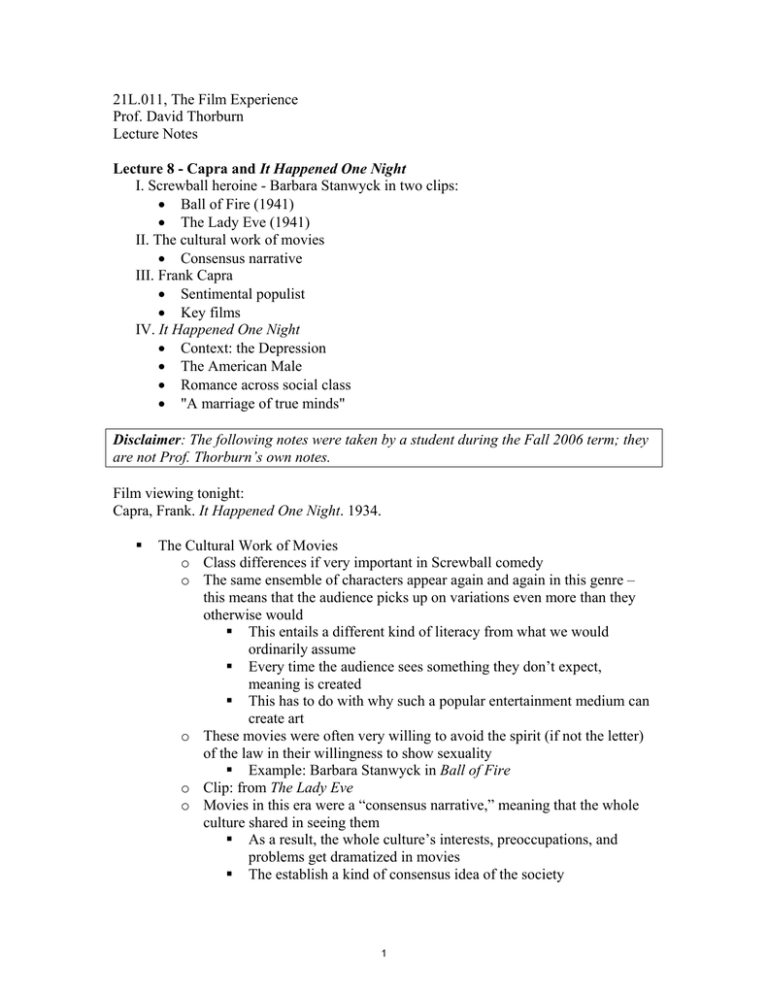
21L.011, The Film Experience Prof. David Thorburn Lecture Notes Lecture 8 - Capra and It Happened One Night I. Screwball heroine - Barbara Stanwyck in two clips: Ball of Fire (1941) The Lady Eve (1941) II. The cultural work of movies Consensus narrative III. Frank Capra Sentimental populist Key films IV. It Happened One Night Context: the Depression The American Male Romance across social class "A marriage of true minds" Disclaimer: The following notes were taken by a student during the Fall 2006 term; they are not Prof. Thorburn’s own notes. Film viewing tonight: Capra, Frank. It Happened One Night. 1934. The Cultural Work of Movies o Class differences if very important in Screwball comedy o The same ensemble of characters appear again and again in this genre – this means that the audience picks up on variations even more than they otherwise would This entails a different kind of literacy from what we would ordinarily assume Every time the audience sees something they don’t expect, meaning is created This has to do with why such a popular entertainment medium can create art o These movies were often very willing to avoid the spirit (if not the letter) of the law in their willingness to show sexuality Example: Barbara Stanwyck in Ball of Fire o Clip: from The Lady Eve o Movies in this era were a “consensus narrative,” meaning that the whole culture shared in seeing them As a result, the whole culture’s interests, preoccupations, and problems get dramatized in movies The establish a kind of consensus idea of the society 1 Of course, some people are always excluded or marginalized: for example, although 60s television you would never see a black face on screen, even though it was a consensus narrative. On either side, traditional voices and emergent voices both appear. Consensus systems are deeply conservative – it might present certain challenges to the status quo, but it won’t acknowledge that the whole status quo is rotten. This is how television is today Consensus narrative is also deeply collaborative – it has to do with the society’s shared values Within the accepted context of genre forms, the culture is able to confront what might otherwise be considered forbidden or dangerous. This works because the expectations and standards of genre are comforting, so that other differences are more accepted. Hollywood often confronted some of the most controversial issues in genre films. Westerns started out as highly imperialist, but this reversed over time, as the white cowboys became the bad guys Frank Capra – great director o Immigrated to California from Italy at six o Sold newspapers and played the banjo as a child o Graduated as an engineer from Caltech o It Happened One Night, You Can’t Take it With You, Mr. Smith Goes to Washington, A Wonderful Life, and many others It Happened One Night o Think about how stars and genre operated in Hollywood while you watch this film o Production history At the time it was a minor project by a minor studio – nobody expected it to be a success – but it was hugely successful Both leads became stars after this film Notice that the lead actors are missing from the ending – this is because they’d both moved on to other films already o Social context It very subtly and skillfully notes the economic miseries of the 1930s, but without ever throwing it in your face The lead female character is slowly educated in the ways of the world over the course of the film o Class and gender – watch these elements as you watch The Gable character is the “ordinary” character. Colbert comes from spoiled wealth. o Private spaces o The ending 2 This was the film that established screwball comedy as a central Hollywood genre. 3 MIT OpenCourseWare http://ocw.mit.edu 21L.011 The Film Experience Fall 2012 For information about citing these materials or our Terms of Use, visit: http://ocw.mit.edu/terms.
